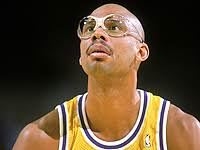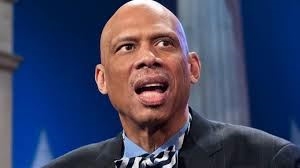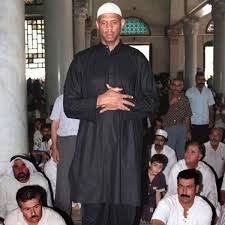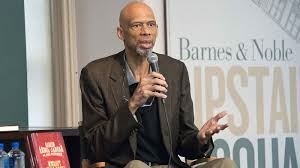 Kareem Abdul-Jabbar Self-Potraithttps://www.nba.comBasketball fans know him as one of the best to ever play. He holds the record for the most career points and has won numerous MVP awards and championship titles, all while playing for the Los Angeles Lakers. However, most people don't know of Kareem Abdul-Jabbar's struggles growing up as a African-American in Harlem and the steps he took to change it for others. Kareem was born, Ferdinand Lew Alcindor on April 16, 1947 in Harlem. When Lew was three, his family moved to the middle-class area of Manhattan. His parents then enrolled him in a all-black boarding school where he faced racism for being a black kid with good grades and persona. During middle school, he was chosen to be on the basketball team because of his six foot tall stature. As the years went on, he continued to dominate in all levels of basketball play. He was accepted into UCLA, where he won 3 collegiate championships. As he moved to the NBA, the success followed him. However, with all the discrimination, he began to stand up for himself, becoming an activist for blacks. He converted to Islam and changed his name to Kareem Abdul-Jabbar. After his basketball career, he continued to fight for his right and the rights of others. Kareem’s involvement in racial and religious issues categorizes him a as a hero. A hero must posses open-mindedness and bravery towards obstacles to be heroic. Because of Kareem’s bravery in getting involved in racial issues and open-mindedness towards religion, he can be seen as a deserving hero, becoming an activist for blacks. He converted to Islam and changed his name to Kareem Abdul-Jabbar. After his basketball career, he continued to fight for his right and the rights of others. Kareem’s involvement in racial and religious issues categorizes him a as a hero. A hero must posses open-mindedness and bravery towards obstacles to be heroic. Because of Kareem’s bravery in getting involved in racial issues and open-mindedness towards religion, he can be seen as a deserving hero.becoming an activist for blacks. He converted to Islam and changed his name to Kareem Abdul-Jabbar. After his basketball career, he continued to fight for his right and the rights of others. Kareem’s involvement in racial and religious issues categorizes him a as a hero. A hero must posses open-mindedness and bravery towards obstacles to be heroic. Because of Kareem’s bravery in getting involved in racial issues and open-mindedness towards religion, he can be seen as a deserving hero.
Kareem Abdul-Jabbar Self-Potraithttps://www.nba.comBasketball fans know him as one of the best to ever play. He holds the record for the most career points and has won numerous MVP awards and championship titles, all while playing for the Los Angeles Lakers. However, most people don't know of Kareem Abdul-Jabbar's struggles growing up as a African-American in Harlem and the steps he took to change it for others. Kareem was born, Ferdinand Lew Alcindor on April 16, 1947 in Harlem. When Lew was three, his family moved to the middle-class area of Manhattan. His parents then enrolled him in a all-black boarding school where he faced racism for being a black kid with good grades and persona. During middle school, he was chosen to be on the basketball team because of his six foot tall stature. As the years went on, he continued to dominate in all levels of basketball play. He was accepted into UCLA, where he won 3 collegiate championships. As he moved to the NBA, the success followed him. However, with all the discrimination, he began to stand up for himself, becoming an activist for blacks. He converted to Islam and changed his name to Kareem Abdul-Jabbar. After his basketball career, he continued to fight for his right and the rights of others. Kareem’s involvement in racial and religious issues categorizes him a as a hero. A hero must posses open-mindedness and bravery towards obstacles to be heroic. Because of Kareem’s bravery in getting involved in racial issues and open-mindedness towards religion, he can be seen as a deserving hero, becoming an activist for blacks. He converted to Islam and changed his name to Kareem Abdul-Jabbar. After his basketball career, he continued to fight for his right and the rights of others. Kareem’s involvement in racial and religious issues categorizes him a as a hero. A hero must posses open-mindedness and bravery towards obstacles to be heroic. Because of Kareem’s bravery in getting involved in racial issues and open-mindedness towards religion, he can be seen as a deserving hero.becoming an activist for blacks. He converted to Islam and changed his name to Kareem Abdul-Jabbar. After his basketball career, he continued to fight for his right and the rights of others. Kareem’s involvement in racial and religious issues categorizes him a as a hero. A hero must posses open-mindedness and bravery towards obstacles to be heroic. Because of Kareem’s bravery in getting involved in racial issues and open-mindedness towards religion, he can be seen as a deserving hero.
 Kareem's work in politics https://www.biography.comOne quality that Kareem Abdul-Jabbar that classifies him as a hero is his bravery towards racial issues happening in his childhood and how he is now standing up for blacks now. During Kareem's childhood, he faced a lot of brutality being a black boy growing up in Manhattan. “His parents sent him to an all-black boarding school in Pennsylvania, where his classmates taunted him for his good marks and beat him repeatedly"(Contemporary Black Biography). With this happening in his life, he was still able to overcome it. He "was the NBA's all-time leading scorer with 38,387 points and had blocked 3,189 shots--also a league high. Abdul-Jabbar was named the league's most valuable player a record six times"(Contemporary Black Biography).He was able to overcome brutality and overcome what other people viewed him as and turn it into his greatest strength. With all the discrimination and racism trying to create a stereotype of blacks, he was able to break that and make a new image of himself and his culture. Another example would be seen as bravery is Kareem's work even after his NBA career, fighting for black rights. "During his retirement Abdul-Jabbar also focused on informing the public about African American history"(Contemporary Black Biography). He wrote many books on numerous issues in African American history. Even after his retirement, Kareem continued to inform the younger generation of what life was like as a black man going through discrimination, through public speaking and writing.He informed the youth of what people went through and to be proud of their differences. Kareem's bravery as a man with color classifies him as a hero.
Kareem's work in politics https://www.biography.comOne quality that Kareem Abdul-Jabbar that classifies him as a hero is his bravery towards racial issues happening in his childhood and how he is now standing up for blacks now. During Kareem's childhood, he faced a lot of brutality being a black boy growing up in Manhattan. “His parents sent him to an all-black boarding school in Pennsylvania, where his classmates taunted him for his good marks and beat him repeatedly"(Contemporary Black Biography). With this happening in his life, he was still able to overcome it. He "was the NBA's all-time leading scorer with 38,387 points and had blocked 3,189 shots--also a league high. Abdul-Jabbar was named the league's most valuable player a record six times"(Contemporary Black Biography).He was able to overcome brutality and overcome what other people viewed him as and turn it into his greatest strength. With all the discrimination and racism trying to create a stereotype of blacks, he was able to break that and make a new image of himself and his culture. Another example would be seen as bravery is Kareem's work even after his NBA career, fighting for black rights. "During his retirement Abdul-Jabbar also focused on informing the public about African American history"(Contemporary Black Biography). He wrote many books on numerous issues in African American history. Even after his retirement, Kareem continued to inform the younger generation of what life was like as a black man going through discrimination, through public speaking and writing.He informed the youth of what people went through and to be proud of their differences. Kareem's bravery as a man with color classifies him as a hero.
 Kareem converted from Catholicism to Islamhttps://www.aquila-style.comAnother trait Kareem posses to classify him as a her is his open-mindedness towards religion, with him converting to Islam and his open mindedness towards receiving help for issues he faced. While playing NBA basketball, Kareem began to protest for black rights. "Throughout the 1960's, the Civil Rights movement, racial and political upheaval, and other events profoundly affected him. In 1968, he began to take more seriously his political and religious principles. He converted from Catholicism to Islam and joined many African American athletes in boycotting the Mexico City Olympics, turning down a spot on the United States basketball team” (St. James Encyclopedia of Popular Culture). He took matters into his own hands to fight for his rights and the rights of others, even if it meant missing the Olympics.He took fight to religion and changed his name to Kareem Abdul-Jabbar and converted to Islam. This can be viewed as heroic because he put his own personal needs aside to help the people in his community. He was more occupied by other people's needs, not the Olympics. Another example of Kareem's open-mindedness is his rehab he went through during his retirement. “Abdul-Jabbar underwent anger-management counseling in 1997 following a battery and false imprisonment conviction”(St. James Encyclopedia of Popular Culture). He was open minded towards the idea of seeking help for his anger issues. This can be seen as heroic because he is showing an example for others with this issue to get help. After his anger management, he accomplished great things, which proves as an example for others. Kareem's open-mindedness toward religion and his anger management classes classifies him as a hero.
Kareem converted from Catholicism to Islamhttps://www.aquila-style.comAnother trait Kareem posses to classify him as a her is his open-mindedness towards religion, with him converting to Islam and his open mindedness towards receiving help for issues he faced. While playing NBA basketball, Kareem began to protest for black rights. "Throughout the 1960's, the Civil Rights movement, racial and political upheaval, and other events profoundly affected him. In 1968, he began to take more seriously his political and religious principles. He converted from Catholicism to Islam and joined many African American athletes in boycotting the Mexico City Olympics, turning down a spot on the United States basketball team” (St. James Encyclopedia of Popular Culture). He took matters into his own hands to fight for his rights and the rights of others, even if it meant missing the Olympics.He took fight to religion and changed his name to Kareem Abdul-Jabbar and converted to Islam. This can be viewed as heroic because he put his own personal needs aside to help the people in his community. He was more occupied by other people's needs, not the Olympics. Another example of Kareem's open-mindedness is his rehab he went through during his retirement. “Abdul-Jabbar underwent anger-management counseling in 1997 following a battery and false imprisonment conviction”(St. James Encyclopedia of Popular Culture). He was open minded towards the idea of seeking help for his anger issues. This can be seen as heroic because he is showing an example for others with this issue to get help. After his anger management, he accomplished great things, which proves as an example for others. Kareem's open-mindedness toward religion and his anger management classes classifies him as a hero.
 Kareem discussing his many bookshttps://news.avclub.comKareem Abdul-Jabbar is a hero because of his bravery towards racism in his community and his open-mindedness towards religion and new experiences. His fights for equality for blacks during the Harlem Renaissance and his public speaking to the younger generation is heroic for people of color. His open-mindedness towards religion and anger management help is also heroic for people going through the same problems. Kareem can be seen as an inspiration for his efforts to fight for racial equality during the Harlem Renaissance. His work just doesn't stop after his basketball career. He kept fighting even into his retirement. "He took the fight to books and public speaking. "During his retirement Abdul-Jabbar also focused on informing the public about African American history. In 2004, Abdul-Jabbar released the book "Brothers in Arms". It told the story of an all African American battalion that served during World War II. Then, in 2011 Abdul-Jabbar published the book "What Is the Color of My World?", which discussed African American inventors. What Is the Color of My World? was a children's book aimed at informing young readers about important African Americans. That same year, Abdul-Jabbar helped produce a documentary called On the "Shoulders of Giants". The film was about the Harlem Renaissance, an African American basketball team that played during the early 1900's” (Contemporary Black Biography). He continues today to inspire young minds and inform them of the past and their culture. Kareem Abdul-Jabbar is a very influential person in our society.His work in basketball is just as impressive as his work with racial discrimination and religion. His heroic fights will be admired for ages to come.
Kareem discussing his many bookshttps://news.avclub.comKareem Abdul-Jabbar is a hero because of his bravery towards racism in his community and his open-mindedness towards religion and new experiences. His fights for equality for blacks during the Harlem Renaissance and his public speaking to the younger generation is heroic for people of color. His open-mindedness towards religion and anger management help is also heroic for people going through the same problems. Kareem can be seen as an inspiration for his efforts to fight for racial equality during the Harlem Renaissance. His work just doesn't stop after his basketball career. He kept fighting even into his retirement. "He took the fight to books and public speaking. "During his retirement Abdul-Jabbar also focused on informing the public about African American history. In 2004, Abdul-Jabbar released the book "Brothers in Arms". It told the story of an all African American battalion that served during World War II. Then, in 2011 Abdul-Jabbar published the book "What Is the Color of My World?", which discussed African American inventors. What Is the Color of My World? was a children's book aimed at informing young readers about important African Americans. That same year, Abdul-Jabbar helped produce a documentary called On the "Shoulders of Giants". The film was about the Harlem Renaissance, an African American basketball team that played during the early 1900's” (Contemporary Black Biography). He continues today to inspire young minds and inform them of the past and their culture. Kareem Abdul-Jabbar is a very influential person in our society.His work in basketball is just as impressive as his work with racial discrimination and religion. His heroic fights will be admired for ages to come.
Works Cited
Cummings Jr., Michael D. "Kareem Abdul-Jabbar." Great Lives from History: African Americans, Oct. 2010, p. 4. EBSCOhost,
search.ebscohost.com/login.aspx?direct=true&db=b6h&AN=55596831&site=brc-live.
“Kareem Abdul-Jabbar.” Biography.com, A&E Networks Television, 18 Jan. 2018,
www.biography.com/people/kareem-abdul-jabbar-9174053.
“Kareem Abdul-Jabbar.” Contemporary Black Biography, vol. 8, Gale, 1994. Biography In
Context, https://link.galegroup.com/apps/doc/K1606001279/BIC?u=powa9245&sid=BIC
&xid=2f8fd45b.Accessed 26 Mar. 18.
"Kareem Abdul-Jabbar." St. James Encyclopedia of Popular Culture, Gale, 2013. Biography In
Context, https://link.galegroup.com/apps/doc/K2419200005/BIC?u=powa9245&sid=BIC
&xid=5d 3389ff. Accessed 27 Mar. 2018.
Page created on 4/18/2018 3:10:44 PM
Last edited 4/20/2018 4:10:52 PM
